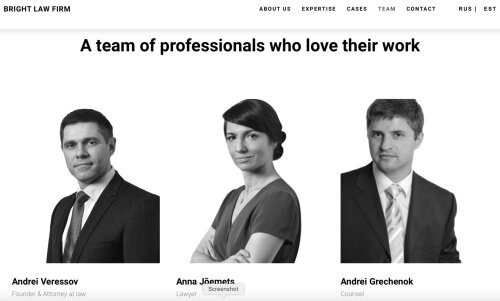Best Art & Cultural Property Law Lawyers in Tallinn
Share your needs with us, get contacted by law firms.
Free. Takes 2 min.
List of the best lawyers in Tallinn, Estonia
About Art & Cultural Property Law in Tallinn, Estonia
Art & Cultural Property Law in Tallinn, Estonia, involves a range of legal norms concerning the protection, ownership, and trade of art and cultural artifacts. Given Estonia’s rich cultural heritage and dynamic contemporary art scene, legal regulations are in place to ensure that cultural property is protected, preserved, and lawfully traded. This area of law often intersects with international treaties and regulations, emphasizing the importance of protecting cultural heritage while facilitating legitimate artistic expression and commerce.
Why You May Need a Lawyer
There are several scenarios where seeking legal advice in Art & Cultural Property Law in Tallinn may be necessary:
- Buying or Selling Art: Whether you are an artist, collector, or dealer, ensuring the legality of art transactions is crucial.
- Preserving Cultural Heritage: Organizations involved in maintaining Estonia's cultural heritage may need legal guidance to protect these assets.
- Art Insurance Claims: If art or cultural property is damaged or stolen, legal advice can help navigate complex insurance claims.
- Export/Import of Artworks: Legal counsel is important to comply with national and international laws related to the cross-border movement of cultural goods.
- Intellectual Property Rights: Artists and creators need to protect their intellectual property and rely on legal assistance for copyrights, trademarks, and patents.
- Resolving Disputes: Art ownership disputes, provenance disputes, and restoration issues may require expert legal intervention.
Local Laws Overview
In Tallinn, the legal framework governing art and cultural property includes the following key aspects:
- Cultural Heritage Protection Act: This act ensures the preservation and protection of national cultural monuments and heritage.
- Copyright Act: Governs the protection of artists' rights and regulates the reproduction and distribution of creative works.
- Act on the Export and Import of Cultural Goods: Establishes rules and permissions required for the trade of cultural goods across borders.
- International Conventions: Estonia is a signatory to several international treaties including the UNESCO Convention on the Means of Prohibiting and Preventing the Illicit Import, Export, and Transfer of Ownership of Cultural Property.
Frequently Asked Questions
1. What constitutes a cultural property in Estonia?
Cultural property in Estonia includes any item of cultural, historical, or archaeological significance, such as works of art, manuscripts, and traditional artifacts deemed valuable to national heritage.
2. How are artists’ rights protected in Estonia?
Artists’ rights are primarily protected under the Copyright Act, which provides creators with the exclusive right to use, reproduce, and distribute their work.
3. Can I export a painting without a license?
Exporting certain artworks may require an export license under the Act on the Export and Import of Cultural Goods, especially if they are considered part of the national cultural heritage.
4. What steps are involved in resolving art ownership disputes?
Resolving art ownership disputes typically involves verifying provenance, negotiating between parties, and, if necessary, going through legal proceedings.
5. Are there penalties for violating cultural property laws in Estonia?
Yes, violations of cultural property laws can result in fines, confiscation of the items, and in some cases, imprisonment.
6. How do international treaties affect art transactions in Tallinn?
International treaties facilitate the protection of cultural properties across borders and can impact how art transactions are conducted legally in Tallinn.
7. What should I do if I find a historical artifact on my property?
If you discover a historical artifact, you must report it to the National Heritage Board of Estonia to comply with legal requirements.
8. How can artists protect their work from unauthorized use?
Artists can use copyright registration, watermarking, and legal contracts to protect their work from unauthorized use and reproduction.
9. How does one become an art appraiser?
Becoming an art appraiser involves specialized education in art history or related fields, and obtaining certification from a recognized appraisal organization.
10. What role does the National Heritage Board play?
The National Heritage Board is responsible for monitoring, preserving, and promoting Estonia’s cultural heritage and ensuring that heritage laws are upheld.
Additional Resources
Here are some resources and organizations that may assist individuals seeking guidance in Art & Cultural Property Law in Tallinn:
- National Heritage Board of Estonia: The primary governmental body overseeing cultural properties.
- Estonian Ministry of Culture: Offers information and advisory services on cultural heritage preservation.
- Estonian Association of Art Historians and Curators: Provides industry updates and resources for professionals involved in the arts.
- Local Legal Firms Specializing in Art Law: Offer legal advice and representation tailored to art and cultural property issues.
Next Steps
If you require legal assistance in the field of Art & Cultural Property Law in Tallinn, consider the following steps:
- Identify Your Needs: Understand the specific legal issues or areas where you need assistance.
- Research: Look for legal professionals or firms specializing in art and cultural property law in Estonia.
- Consultation: Schedule initial consultations to discuss your situation and evaluate their expertise and compatibility with your needs.
- Engage a Lawyer: Choose a lawyer or legal firm that you trust and who understands your goals and challenges.
- Stay Informed: Keep abreast of any changes in laws or regulations that may affect your case or interests.
Lawzana helps you find the best lawyers and law firms in Tallinn through a curated and pre-screened list of qualified legal professionals. Our platform offers rankings and detailed profiles of attorneys and law firms, allowing you to compare based on practice areas, including Art & Cultural Property Law, experience, and client feedback.
Each profile includes a description of the firm's areas of practice, client reviews, team members and partners, year of establishment, spoken languages, office locations, contact information, social media presence, and any published articles or resources. Most firms on our platform speak English and are experienced in both local and international legal matters.
Get a quote from top-rated law firms in Tallinn, Estonia — quickly, securely, and without unnecessary hassle.
Disclaimer:
The information provided on this page is for general informational purposes only and does not constitute legal advice. While we strive to ensure the accuracy and relevance of the content, legal information may change over time, and interpretations of the law can vary. You should always consult with a qualified legal professional for advice specific to your situation.
We disclaim all liability for actions taken or not taken based on the content of this page. If you believe any information is incorrect or outdated, please contact us, and we will review and update it where appropriate.















